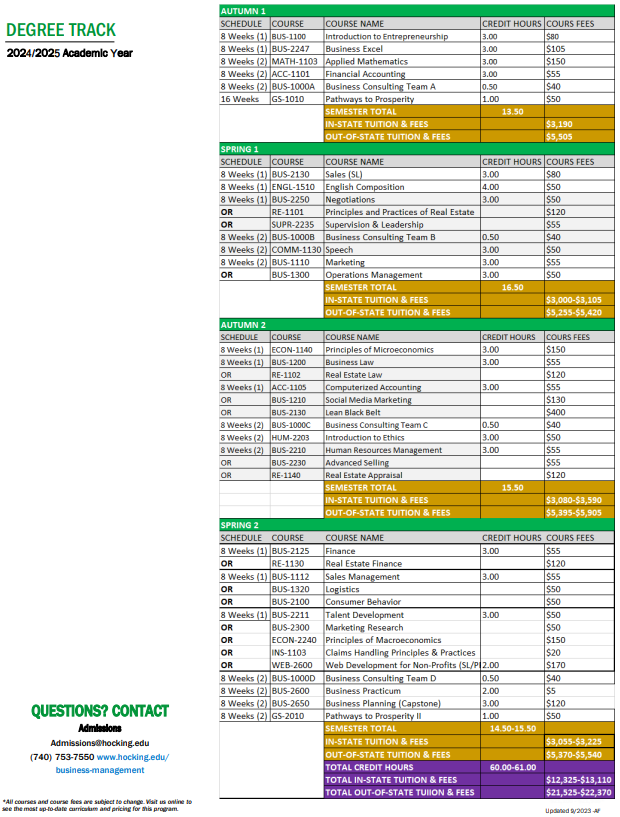Business and Entrepreneurship Program Description
Hocking College’s associate degree program is designed to provide business and entrepreneurship-oriented training to both students who are new to the business world and established professionals who have aspirations of one day going into business for themselves.
The training students receive in Hocking College’s Business Management & Entrepreneurship program prepares them for careers in the business management field and includes a practicum in an area business, industry or agency in addition to an optional internship or cooperative work experience.
Hocking College offers all-inclusive pricing and works with students to assure they have complete college funding, including financial aid, before they start classes. Please reference the course curriculum tab for program costs.
All-inclusive pricing includes the following:
PER SEMESTER
$300......Learning Fee
$20........Health Center Services
$75........Career Center Services
Not part of the All-Inclusive pricing
$53......Parking
Pricing for housing and meal plans can be found here.
Learn Why Students Love This Program at Hocking College
Completion of the Business Management and Entrepreneurship program prepares you for entry-level positions as a manager or a manager trainee, and ultimately, to own and operate your own business.
Specialized certificates also provide opportunities for employment as a personnel manager, realtor or sales associate.
Courtesy of Hocking College’s smaller class sizes students will be able to get the crucial one-on-one time with their instructors they need to develop the following business-related skills:
- How to develop accounting records
- How to make sound management decisions
- How to understand the legal system as it relates to the business world
- How to develop and implement appropriate marketing strategies
- How to maintain high ethical standards in business dealings
- How to assemble an effective staff
- How to use effective quantitative skills in business activities
Student Learning Outcomes (SLOs) are statements of what a student will be able to do when they have completed a program. They represent the knowledge and skills a program has determined are most important for students to gain from that program and include both the Success Skills (institutional outcomes) and Program Outcomes. SLOs are specific and measurable so the program can accurately assess the degree to which students have achieved each outcome, and they align with college and institution mission and values. Data on the achievement of SLOs is used to make improvements in the program and increase student success.
Hocking College Institutional Learning Outcomes
1) Demonstrate sound critical thinking, information literacy and technological competency in the production of academic writing and presentations
2) Apply the methods of mathematical, statistical or analytical reasoning to critically evaluate data, solve problems and effectively communicate findings.
3) Demonstrate an awareness of the social, political and economic forces which shape individuals, institutions and communities in the modern world.
4)Understand social justice and the diversities and complexities of the cultural and social world past and present and come to an informed sense of self and others.
5)Demonstrate a foundation of knowledge in the natural sciences based on theory and laboratory skills.
6) Cultivate ethical values, personal wellness and personal learning strategies in the development of the whole person, mind, body and spirit.
7) Integrate content material to application in the workforce and apply discipline specific knowledge and skills to successfully transfer or effectively meet the expectations of internships, workplace, volunteerism and/or entrepreneurship endeavors.
8) Utilize the ethical and professional application of current information technology and tools effectively.
Program Outcomes
The following outcomes are skills, behaviors, and attitudes cultivated in students seeking the Associate of Applied Business in Business Management and Entrepreneurship:
- Effectively use a computer to develop accounting records;
- Make sound management decisions based upon planning and examination of appropriate alternatives;
- Understand the legal system as it relates to business systems
- Develop and implement appropriate marketing strategies;
- Maintain high ethical standards in business dealings;
- Effectively perform the staffing process;
- Perform various analytical business tasks; and
- Use effective quantitative skills in business activities
Retention Rates
- All registered fall/autumn students with registration status for the following fall/autumn.
- Excludes special populations - College Credit Plus, Non Degree, Online Military and University Center.
Potential for upcoming fall/autumn excludes graduates from that fall/autumn, spring and summer terms.
| Academic Year | Retention Rate |
| 2016 - 2017 | 33% |
| 2015 - 2016 | 40% |
| 2014 - 2015 | 35% |
Graduation Rates
Graduation rates are determined by the office of Institutional Research. To ensure appropriate time for data collection, this report will be run and posted annually in the last week of September for the previous academic year. It should be noted that annual graduation rates may change as students continue to graduate. The following criteria will be utilized for the calculation of graduation rates:
- Overall Program Completion Rate is defined as a percentage of the ratio:
All graduates of the program
_________________________________________________________________
All students with the program in their history of programs of study - For the purposes of reporting, the program completion rates are aggregated by academic year of entry.
- A student is considered to have completed or graduated from a program or certificate by virtue of having been awarded the degree or certificate.
- A student is considered to be undertaking activity in a program of study for the duration of time that they are in an active status in a program or certificate. This is defined by having a Program of Study with a status of ‘A’ during the duration of time they are taking coursework. Should a student move in and out of active status in a program of study while continuing to take coursework, we only take into account the student’s activity while the program has an active status for that particular program of study.
| Academic Year | Graduation Rate |
| 2016 - 2017 | 4.35% |
| 2015 - 2016 | 11.48% |
| 2014 - 2015 | 17.93% |







